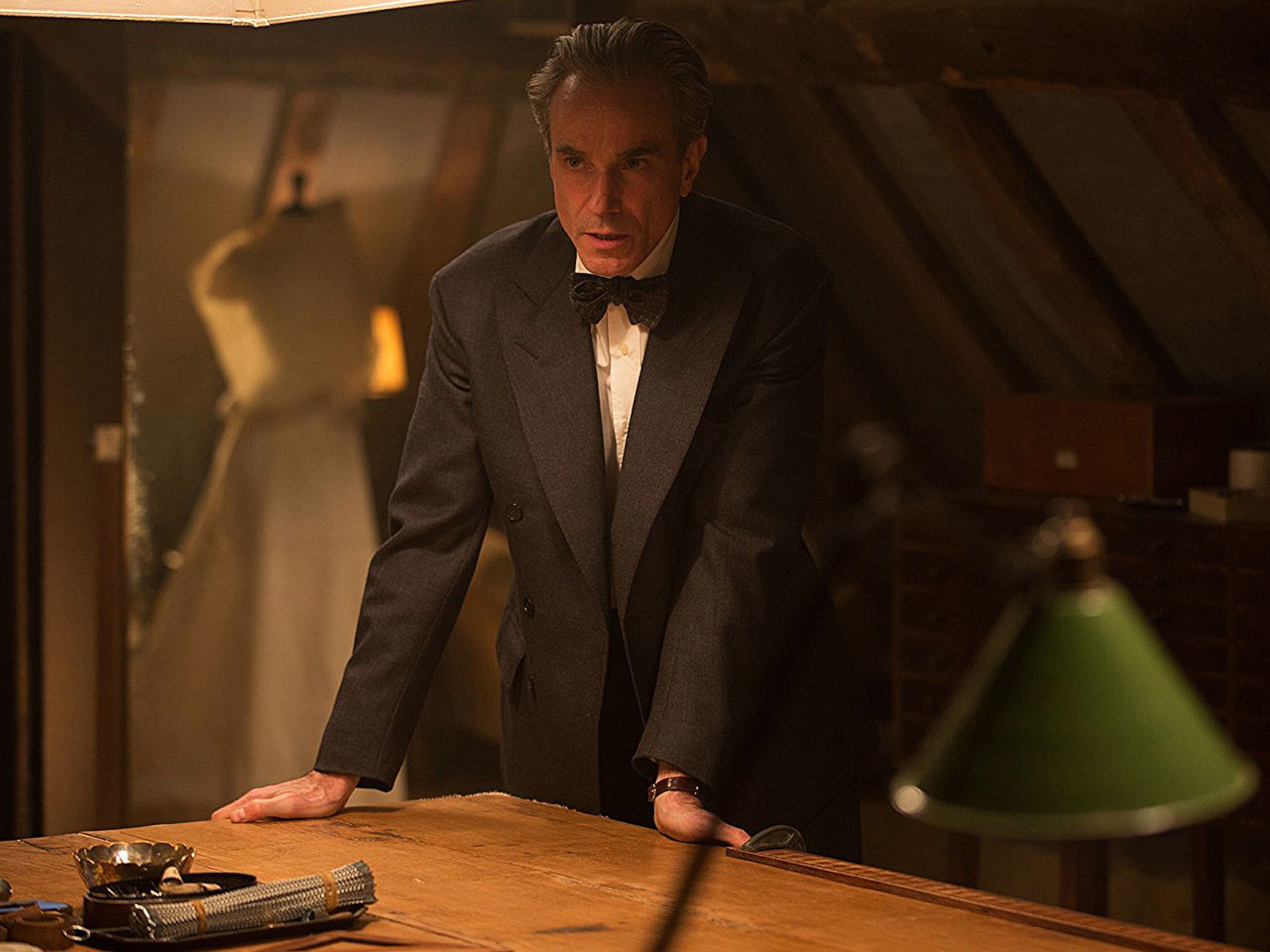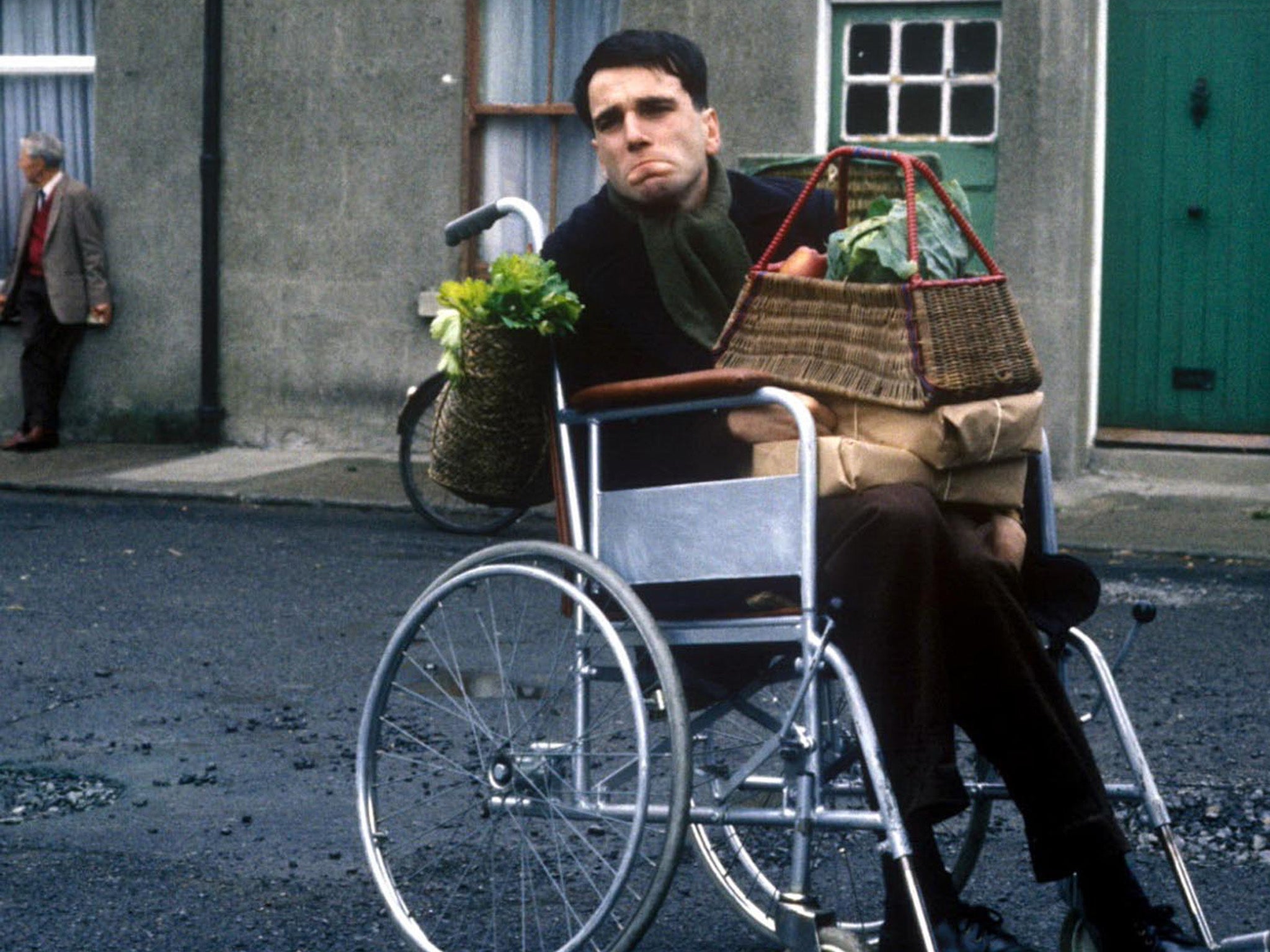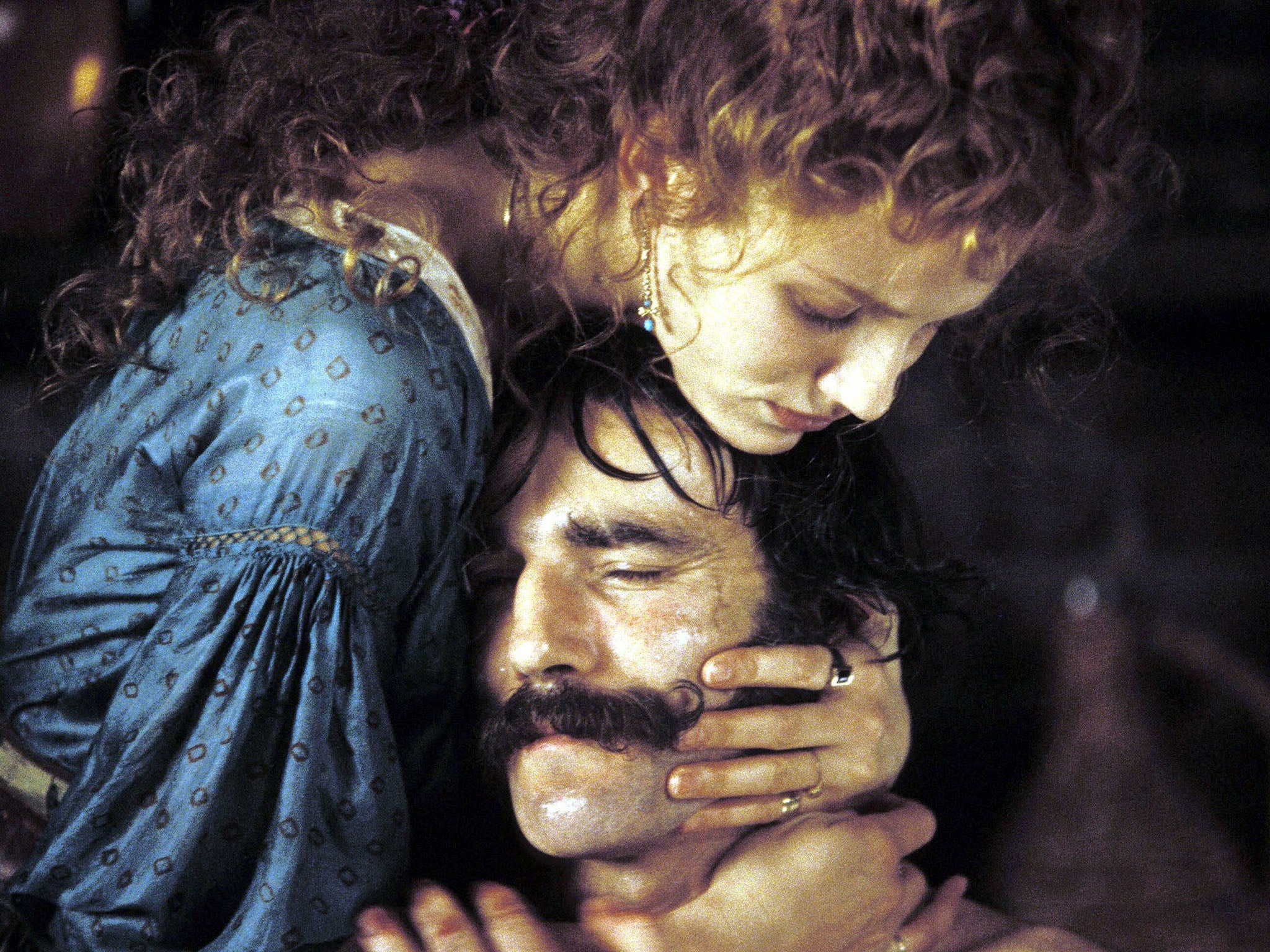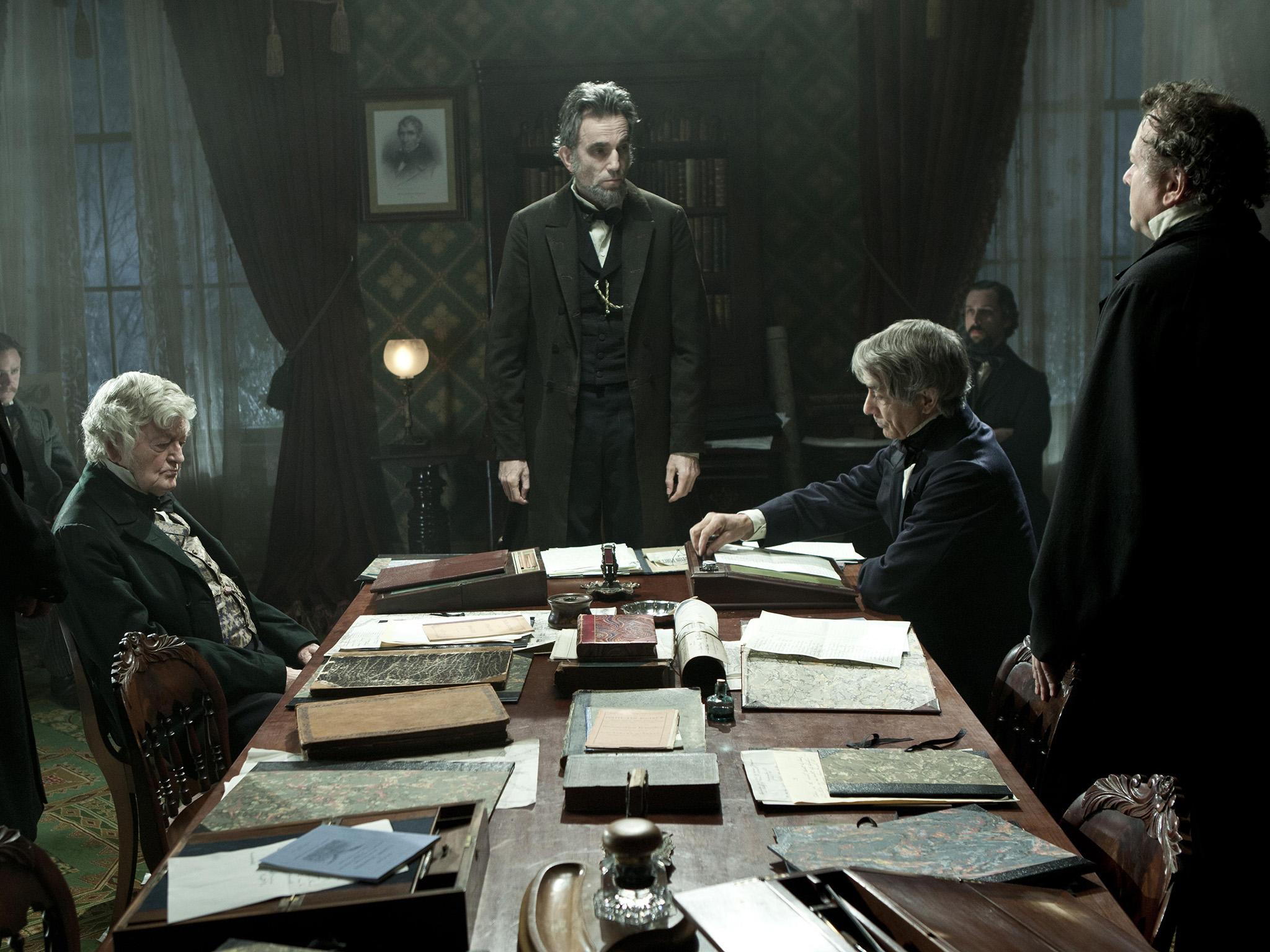Daniel Day-Lewis: Why Britain has just lost its De Niro
In his last role before his retirement, the triple-Oscar-winning actor plays a dressmaker in Paul Thomas Anderson's ‘Phantom Thread’ – a film Day-Lewis can't bear to watch

What did Daniel Day-Lewis see in Phantom Thread’s pattern that spooked him so? The part of Reynolds Woodcock – an haute-couture designer in 1950s London who treats young women as disposable accessories to his visions, until he meets Alma (Vicky Krieps) and the professional thread of his life snags – brought the actor to the end of something, too. The end of acting itself, he soon told the world. This was “a big drag for all of us”, the film’s director Paul Thomas Anderson said, unconsciously echoing Paul McCartney’s phrase of stunned understatement when John Lennon was shot, and hardly sounding less appalled.
The film’s title perhaps refers to a curse that can hang over dressmaking, which leaves Reynolds tethered to his sister and, in one sickened hallucination, haunted by his mother. Then there’s Reynolds’s pursuit of spectral perfection, of silence, order and shape in life and art to keep lurking chaos at bay. Not for the first time, the obsession seems autobiographical of an actor whose disappointed desire to perfect each role is legendary.
Day-Lewis’s six months living off the land preparing for The Last of the Mohicans (1992), his staying in character throughout each shoot so that, as cerebral palsied poet Christy Brown in My Left Foot (1989), he needed help to get into his wheelchair, the reincarnation of Abraham Lincoln down to the reedy Kentucky cadences of his voice and weary unfolding of his long body in Lincoln (2012): this was all seen as a passing of the torch from Robert De Niro, who lost the energy for such obsession as Day-Lewis gained his.

But the Day-Lewis we now seem to be losing was De Niro’s heir in a more fundamental way. For a precious decade from Mean Streets (1973) to Once Upon a Time in America (1984), De Niro was an unknowable mystery, a seeming husk passing from role to role, other-worldly in his strokes of genius. Though Day-Lewis says his “most important film experience” was watching Britain’s Sixties “kitchen-sink” cinema, and his star-making role in My Beautiful Launderette (1985) took that tradition down new paths of race and sexuality, he also abandoned it there. The same year’s A Room With a View said goodbye to Britain’s heritage cinema, and he quit theatre in 1989. Realism and the stage weren’t for him. Instead, the De Niro-like “mystery” he often talks of preserving in his work is unique among male British actors (Tilda Swinton is an actress who rivals it).
His Anglo-Irish, poet laureate father Cecil Day-Lewis and Jewish mother Jill Balcon (the actress daughter of Ealing Studios boss Sir Michael Balcon) made him an ethnic and class outsider during schooldays in relatively tough parts of Greenwich, south-east London. He’s even more of an outsider from British cinema, a Blakean figure who dabbles in magical and spiritual theories to get lost in his art. He told a trusted American interviewer, Charlie Rose, that his need to stay in character might be “pure paganism”; that acting itself was the worshipped idol he had “faith in”. It was his “salvation” from an inchoate, wild childhood. “But of course it’s bound to let you down,” he said. “It’s a very fragile form.”
This often disappointed faith plays out in even minor roles. Nine (2009), the musical remake of Fellini’s 8½, was misbegotten. But as artistically blocked director Guido Contini, Day-Lewis utterly convinces when shuffling down a street in defeated, anonymous retirement. The character’s opening speech could describe his current artistic agonies. “The film is a dream,” he sighs. “You kill it writing it down. You kill it with the camera...for a moment, your actors breathe life back into it. But then it dies again.”

With Phantom Thread’s Reynolds Woodcock, this creative connection to a role was more intimate than ever before. Simply wanting to work with Day-Lewis again after their first film together, There Will Be Blood (2007), Anderson offered his barely formed notions for a script. The actor then participated “very closely” in the writing, Anderson told Rolling Stone. “In terms of the dialogue ... there are massive amounts of lines that are all him ... he would write these fantastic flourishes that could only come from Reynolds.” Even Reynolds Woodcock’s name, teetering between epicene refinement and obscene absurdity, was created by Day-Lewis. The late 1950s London setting, meanwhile, became a sentimental journey back into the lost English world of his childhood. More specifically, it recalled his poet father, who died when Day-Lewis was 14.
“My dad was very like Reynolds Woodcock,” he told W magazine. In his last minutes as a stage actor, playing Hamlet in 1989, his father’s ghost seemed to rear up in place of that of Hamlet’s father, making him tearfully unable to continue. In Phantom Thread, Reynolds Woodcock’s dead mother stares sadly back at him in a moment of crisis. You could see this as a circle closing for Day-Lewis, or a wound being ripped open. At any rate, as he turned 60 playing a man much like his father – who died aged 68 – a “sadness ... settled on me ... during the telling of the story”. “There’s something of the responsibility of the artist that hung over me,” he added, trying to explain his mood. “I need to believe in the value of what I’m doing.” He no longer believed in it enough.
Something broke in his film acting once before. He “hates” the job, director Jim Sheridan infamously said after their third collaboration, The Boxer (1997), became an unhappy, compromised experience which wore him out. Vanishing to Italy for five years with his wife and young son, he became a cobbler.

It was after this mythic period in the wilderness that Day-Lewis found his full glory. Before, he had favoured wild, romantic outsiders, whether as Hawkeye roaring through hostile armies as if they’re mist to rescue his true love in Last of the Mohicans, or a witch-hunt’s rough martyr in The Crucible (1996). Now, he found the nerve to be a monster. Lured back to work by Scorsese, he made the 19th century gang-leader Bill the Butcher in Gangs of New York (2002) a figure of brute, brimstone malevolence, a wax-moustached, music-hall Satan. The screen seemed to tilt towards him when he shared it with his co-star, Leonardo DiCaprio. This was a heavyweight let loose, the reserve and refinement of most previous English screen acting behind him in the dust.
When his south London contemporary Gary Oldman went that wild, it was usually a manic joke. As Day-Lewis pumped himself up to be Bill by playing Eminem’s anthem “Lose Yourself” in his dressing room, he was more like a troll beneath a bridge, readying real mayhem. There was a relatively gentle interlude in his wife Rebecca Miller’s The Ballad of Jack and Rose (2005). Then Paul Thomas Anderson offered him Daniel Plainview in There Will Be Blood, taking him deeper into an absurd and tragic heart of darkness.
Plainview’s black-eyed squint at a world he despises, as if seeing it through the stygian dust of the mine where we discover him, is almost as memorable as his hoarse yet mesmeric bark of a voice. “I like to kid myself that I can hear that voice before I make the sound of it,” Day-Lewis mused, as if Plainview was in the ether, waiting for him. During the 30 years the film covers, the character tears strips off his own humanity. “He makes me laugh,” said Day-Lewis.

“There’s nothing mad you can do that he won’t encourage me to be madder,” he explained of Anderson, when they discussed Phantom Thread last week. Reynolds Woodcock is therefore the last and most personal in the actor’s gallery of grotesques. But the film is haunted for him, with “spells” in it he can’t explain. What he has called “bereavement” in the drifting aftermath of previous roles overtook him even as he was making it. There were “many melancholy moments”, Anderson accepts, many more than in the script. Day-Lewis can’t bear to watch it.
Charlie Rose once got him to recall his first retirement, from the theatre. “And now looking back at it, we reach what we think are the boundaries of our endurance, 10 minutes later thinking that ... I could have gone further,” he reflected of his sudden exhaustion then. “But quite honestly ... I was beyond caring at that moment. I’d done it enough. I couldn’t do it any more.” He was talking about Hamlet specifically, but never set foot on a stage again. A similar need for self-preservation has cut the cord with cinema. This second retirement’s urgent announcement felt like an emergency operation, cauterising a depressive poison’s spread. He couldn’t do it any more.
“The responsibility of a creative life ... is both a curse and a blessing,” Day-Lewis said last year. “You can never separate them till the day you die.” Acting seemed to die for him on the set of Phantom Thread. He had only 16 leading roles in 33 years, five of them Oscar-nominated, three successfully. And yet the personal disappointment and damage that are his work’s private “curse” cancels all.
Talking about his old job, Daniel Day-Lewis sounds as bereft as a priest who’s lost sight of God, or a lover whose life-partner is gone. Though he’s likeably aware of how pompous this can seem, that’s the level of belief he brought to acting.
Of course, his beloved wife and children are very much alive. Maybe a future in acting will be again. For now, Reynolds Woodcock is his parting gift: an artist consumed by his fastidious genius, who concludes that what he really needs is a long lie-down. The actor admitted to sharing Plainview’s “fever” in his previous Anderson film, a mania for acting like his character’s for oil and power. “I’m finished,” Daniel Plainview finally says. Daniel Day-Lewis, too.
‘Phantom Thread’ is in cinemas from 2 February
Join our commenting forum
Join thought-provoking conversations, follow other Independent readers and see their replies
Comments
Bookmark popover
Removed from bookmarks